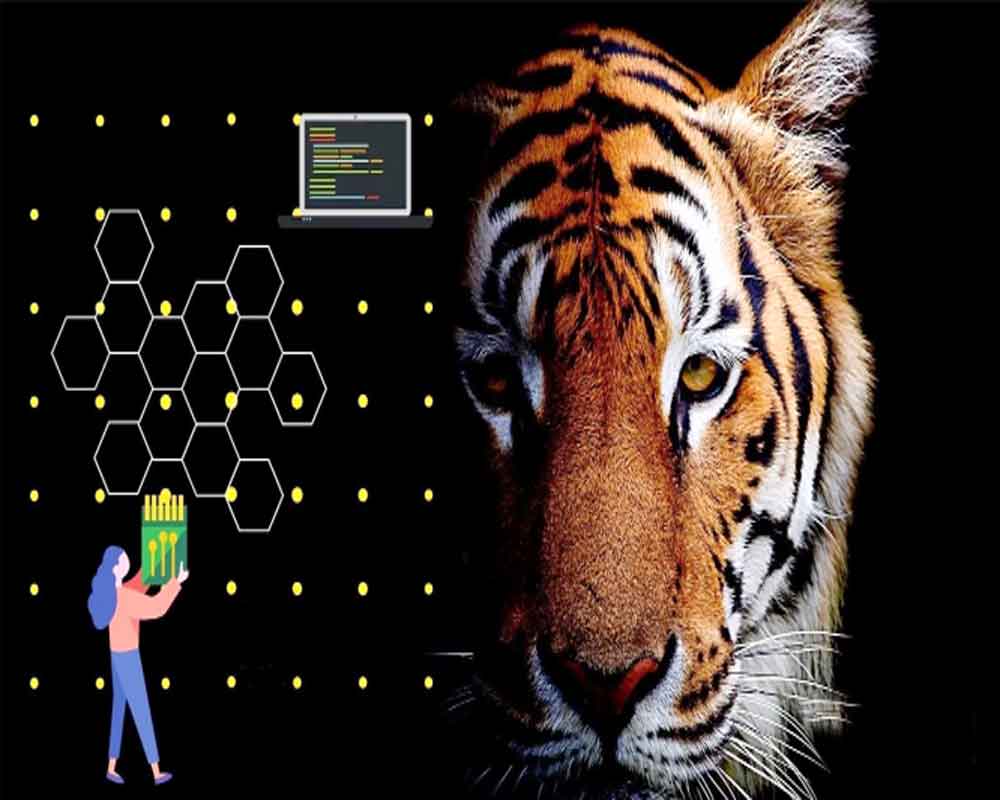From environmental eDNA technology used to create a repository of country's captive elephants through genetic material in dung, artificial intelligence (AI)-enabled drones for monitoring cheetahs health in Kuno in Madhya Pradesh to investigating habitat use of Whale sharks through satellite telemetry studies in Gujarat — cutting-edge innovative digital tools are increasingly being applied for wildlife conservation to keep a track on poachers.
There's more. Researchers are deploying remote cameras with AI capabilities to prevent tiger attacks on livestock, thereby mitigating conflicts with their owners.
"Where we're working, tigers are killing livestock on almost a daily basis," said Jeremy Dertien, a postdoctoral researcher at the German Center for Integrative Biodiversity Research about the Dudhwa Tiger Reserve in Uttar Pradesh.
He said the residents have proven "amazingly resilient" in the face of the roaming cats. But, Dertien said, being able to keep track of the tigers could help them coexist.
Similarly, in Gujarat's Rajkot, the forest department, along with the Wildlife Trust of India (WTI), is using the artificial intelligence through satellite tagging of whale sharks as part of an elaborate strategy to conserve this endangered species. Late last month, a 27-foot-long whale shark, which got entangled in a fishing net at a harbour, was tagged with a satellite transmitter and later released into the sea in a healthy condition.
The release is part of the project to conduct satellite telemetry studies of five whale sharks.
This follows WTI success when it had deployed satellite tags in eight whale sharks of Gujarat between 2011 and 2017. It provided valuable insights into their extensive migratory patterns. Akshay Joshi, Deputy Conservator of Forest, Junagadh said that the project aims to understand the behaviour pattern of aquatic animals like where it goes for breeding, in which continents it migrates etc.
This tag, which is much more technologically advanced, will provide more accurate information even if the whale shark goes deep into the sea. "The information will be transmitted even when the whale shark travels at maximum speed during storms or cyclones," State Chief Conservator of Forest, K Ramesh added.
Experts say innovative technologies are revolutionising wildlife conservation efforts, making them more accessible, user-friendly, and data-efficient than ever before. For instance, eDNA technology allows researchers to detect and identify species by analysing genetic material present in environmental samples such as water or soil.
The Union Environment Ministry has already profiled 270 elephants since August 2022, aiming at ensuring better protection has been completed. DNA profiling is the process where a specific DNA pattern, called a profile, is obtained from a sample of bodily tissue. The DNA profiling will act as the 'Adhaar card of captive elephants, said an official from the Ministry.
Earlier, the captive elephants were chipped electronically, but in vain. At the Kanha-Pench corridor in Madhya Pradesh, wildlife officials are experimenting with cameras with infrared sensors that harness the power of artificial intelligence (AI).
These are deployed to count wild animals or monitor the movement of potential poachers. The results are already visible. For the first time, poachers were caught on camera, helping authorities secure a conviction.
This AI-powered TrailGuard-AI camera system which is the world's most advanced wildlife monitoring and security system, providing real-time images of the endangered species, poachers and landscape to the forest authorities has been deployed in Dudhwa Tiger Reserve (DTR) in Uttar Pradesh also, as per a study 'Mitigating human-wildlife conflict and monitoring endangered tigers using a real-time camera-based alert system' published in the BioScience.
With forest protection staff spread so thinly across large landscapes, new technology that can provide real-time data notifications for conservation personnel could be a massive aid in preventing poaching or conflict before it occurs or afterward for quickly identifying poaching suspects, said the authors including Rajesh Gopal and Himmat Singh Negi from Global Tiger Forum, Ramesh Krishnamurthy from WII, and Sanjay Kumar Pathak from DTR.
Vishal Singhal, author and co-founder and AI evangelist at Cellstrat noted that forest rangers in India are increasingly using technology such as cameras and AI to monitor tigers as well as poachers.
According to them, he said, AI could tell beforehand where the tigers will move next. This will help the rangers to protect the tigers in advance. Some of the recent technology-backed initiatives have been successful, as certain regions in India have seen their tiger population numbers slightly increase, said Singhal. World across the role of technology is being accepted.
Recognising the transformative power of technology in safeguarding the flora and fauna across the globe, "Connecting People and Planet: Exploring Digital Innovation in Wildlife Conservation," themed event was organised by the CITES (Convention on International Trade in Endangered Species of Wild Fauna and Flora) on March 4, 2024.
CITES Secretary-General Ivonne Higuero talked about promoting innovative technological solutions to address the triple planetary crisis while ITU Secretary-General Doreen Bogdan-Martin recounted how technology can transform life on land and below water, improve economies and protect ecosystems.

























